CONCORDIA UNIVERSITY, MONTREAL
October 9, 2013
POLITICAL ANTHROPOLOGY (excerpts)
See photos and report below
Click here to see the book cover.
ANTH 423, Dr. Maximilian Forte, Dept. of Sociology & Anthropology, Concordia University, Montreal
With a Special Focus on Democracy, the State, and Movements
Fall Semester, 2013-2014, 03 credits
A Brief Introduction
Up until the 1950s, political anthropology was preoccupied with politics in non-Western societies, typically focusing on small-scale, local and regional social bodies, with an interest in questions of authority, coercion, order and stability. Initially there was even a debate about whether one could even find either politics or power in non-state societies, for lacking centralized structures of control and greater degrees of social equality. Kinship, custom, and contract were some of the dominant ways of understanding power in the so-called non-state societies. Since then, much has changed in political anthropology.
In contrast to earlier characterizations of stable, local social formations, seen as homogeneous wholes that seemingly existed free of the impact of forces such as colonialism, slavery and the world market, anthropologists have argued in recent decades for different ways of conceptualizing power and its presence. One way to reinterpret the presence of power in shaping local politics was to recognize the fact that the “remote” communities anthropologists had been studying had been incorporated into a global system of unequal power relations. Anthropologists became more explicit in their theorizing that they had never actually studied any “non-state society” ethnographically, because by the time they encountered these societies they had long been incorporated by local states, colonial administrations, and the broader forces of empire.
In addition, anthropology was itself critiqued, both from within the discipline and from without, as itself being the product of empire, a discipline that experienced its fruition in colonial settings, often directly or indirectly collaborating with colonialism itself. The anthropology of politics began to cross over into the politics of anthropology in new and interesting ways.
Another means of reworking the anthropology of politics and power was to take a new look at the relationships structuring these local societies that typically were at the centre of their ethnographic studies. Some anthropologists began to argue that communities once portrayed as egalitarian, instead possessed some degree of internal inequalities in decision-making and unequal access to resources. Questions emerged as to which societies tended to be more egalitarian than others, especially by reference to the role of women, the sexual division of labour, and access to resources.
From the 1970s onward, new concepts came to dominate political anthropology. The most prominent have been ideology, hegemony, class, and power. Anthropologists now sought to uncover the ideological and social means by which some groups seek to attain or assert power as well as the resistance faced by such groups.
Recognizing power operating at all levels is not necessarily an analytical panacea. Arguably we ought to be wary of overly conspiratorial notions of power as absolute, of institutions exercising total control, of persons as pawns or dupes. On the other hand, the other extreme might not be better, that being a view of persons as self-determining free actors, as all-knowing subjects that master their own destinies, in a situation that is shaped by mere coincidences and opportunities. The notion of cultures as living in a state of unceasing contestation, rife with conflict, unable to achieve stability and consensus, is also problematic.
Therefore given the various positions we will encounter on culture, power and anthropological understandings, you should be most alert and critical. In this course we will investigate various sources and expressions of power, as well as the ways in which anthropologists have sought to theorize and study power in ethnographic and theoretical terms. But in order to renew political anthropology, we will also study that which is not yet discussed by political anthropologists, or not discussed to a sufficient degree (see the next section).
For the purposes of this course, which is necessarily brief, the nation-state will be the prime focus of attention.
Democracy, the State, and Movements
As seen in the foregoing paragraphs, the concept of “non-state societies” recurred continually in the early decades of political anthropology’s development. Increased attention and critique have been devoted to unveiling the extent to which early political anthropologists adopted models from their own societies, and the supreme political structure of the state, as a way of understanding all other societies. That is a Eurocentric approach, and one that can, at times, place all societies on a single evolutionary line, each assumed to be at different stages of achieving “stateness”. The weight of the Enlightenment has left a deep imprint on all political anthropology, from the start to the present day. In trying to “make the strange familiar,” generations of political anthropologists simply adopted familiar assumptions, models, and concepts and applied them to all that was commonly deemed “strange” by the standards of their own society—hence, the ultimate point of reference, marked even in its absence, was the state, along with property and coercion. This mirrored what developed in wider discourses in modernization and development theories and policy circles in the West, where the persistence of traditional social forms was treated as a problem to be solved, and where new states were formed after colonial rule their “crises” were treated as if stemming from an inherent pathology.
Rarely, if ever, did anthropologists fulfil the second part of the promise, that is, to “make the familiar strange” by turning the lens back on power in their own societies, for all of the alienation that they are said to have routinely experienced. That is where this course takes its cue for a departure.
Rather than simply recite the “old classics” of political anthropology as if this veneration were a valid end in itself, and rather than limit ourselves only to what anthropologists have written (instead of what anthropology students need to know and consider), our work will focus on making what is familiar to us a little more “strange,” by posing questions that challenge routinely accepted “common sense” and by spotlighting the taken for granted ideas of political power. We do so by way of three “cornerstones” of contemporary political life in our society: the theories and practices of democracy; the power of the state; and, the character and work of movements in reinforcing, reforming, or dismantling the current system of political power.
One of the most common, taken for granted notions is that we live in a democracy, while many other people on this planet do not. Thanks to the dominant discourse of politics, propagated not just by members of the political class but by the mass media and even many academics, we are presented with a simple, stark dichotomy: there are democracies, and their opposite, “dictatorships” and “tyrannies”. This new orthodoxy is built on the bones of a much older one: a world divided between the “civilized” and the “barbarians” or “savages”. In contrast to the now conventional regimes of truth establishing the legitimacy and superiority of “our system,” raised as exceptional and unassailable, we will be considering other alternatives.
Seeing that the state has been such a dominant conceptual framework in political anthropology, it now seems appropriate to examine and question how the state works in our own society, rather than continue using it as a lens to understand all other social formations of the past. The state as a political model that is considered “normal” and indispensable, is an idea that can be found in use by politicians and policy-makers in the West today who class other societies as either “failed states” or “weak states” with “lawless” regions, as if such notions were unproblematic. In our time and in our societies (North America, Europe), the state has become even more prominent as a force of domination, surveillance, and militarization. Some activists, in turn, either seek to “smash the state” or to “rescue” it by transforming its role in society. As the central institutional mode by which political power is organized in our society, either way we cannot escape the state.
Outside of the state and its entrenched political parties, we frequently hear of “civil society” and “new social movements,” as other sources of political action that sometimes advance their own theories of political power. One of the aims of this course, albeit far too brief, is to get a handle on what these phenomena entail, how we think about movements and what they mean, and where movements fit within our political system.
Case studies for this course will be drawn primarily from Africa, Latin America, Europe and North America.
ABOUT DR. MAXIMILIAN FORTE
I am a professor of anthropology in Montreal, Canada. I did an Honours B.A., with a double major in Latin American & Caribbean Studies, and Spanish Language, Literature, and Linguistics (including Latin America) at York University, from which I graduated in 1990. I then decided to move to Trinidad & Tobago, where I enrolled in the post-graduate diploma program at the Institute of International Relations at the University of the West Indies, St. Augustine. After completing the one year program, I continued into the start of the M.Phil program, which I discontinued after two years. I was in Trinidad from 1990 until 1993. In 1994 I began a M.A. in Socio-Cultural Anthropology at the State University of New York at Binghamton, where I also continued and developed my interests in world-systems analysis, taking courses in other departments with Immanuel Wallerstein, Giovanni Arrighi, and Anthony King. I also completed the first year of the Ph.D program there, but then moved to Australia, where from 1997 through 2001 I completed my Ph.D in Anthropology at the University of Adelaide. I then moved back again to Trinidad & Tobago, where I remained until 2003, and eventually achieved Permanent Resident status, the first step on the way to gaining Trinidadian nationality. In 2003 I took up my first tenure-track position in Anthropology, in the Department of Anthropology and Sociology, at what was then called the University College of Cape Breton (the name changed to Cape Breton University in my final months there). In 2005 I accepted an offer for a second tenure-track position, in the Department of Sociology and Anthropology at Concordia University in Montreal, where I received tenure and have been promoted to associate professor. I remain attached to my interdisciplinary background, and most of my research has not fallen neatly within any one discipline. I continue to remain conversant with a great deal of work done by non-anthropologists.
In the past I have also lived in Italy, and spent extended periods in England, as well as French Polynesia. My first language was Italian, which I continue to speak, in addition to Spanish, and I have a reading ability in French. I still consider Trinidad to be my real home, and my friends and in-laws remain there. I am both a Canadian and Italian/EU citizen.
I am the author of Ruins of Absence, Presence of Caribs: (Post)Colonial Representations of Aboriginality in Trinidad and Tobago (2005), and the editor of Indigenous Resurgence in the Contemporary Caribbean: Amerindian Survival And Revival (2006) and Indigenous Cosmopolitans: Transnational and Transcultural Indigeneity in the Twenty-First Century (2010). In addition, I edit and publish student research: see The New Imperialism, Vol. I. Two more edited volumes to come out soon will be The New Imperialism, Vol. II and Who Is An Indian? More about my publications appears on the pages devoted to publications and papers on this site.
My areas of special interest have included colonialism and indigenous cultures in the Caribbean, ethnographic film, new media, and political anthropology. I am a founding member of Anthropologists for Justice and Peace (AJP).
I started Zero Anthropology (first called "Open Anthropology") back in October of 2007. The lead site was the blog. The focus of my writing has since been on militarism, the militarization of the social sciences, U.S. foreign policy, imperialism, decolonization, the Human Terrain System, the Minerva Research Initiative, and various forms of "humanitarian imperialism". I focus on anthropology after empire, and occasionally items about the Caribbean, with a mixture of humorous pieces, video posts, and fiction. My articles on the Zero Anthropology blog, numbering more than 1,000, have covered topics pertaining to Canada, the U.S., Trinidad & Tobago, Mexico, Zimbabwe, Iran, Iraq, Greece, Gaza, Libya, and Afghanistan. All of these articles are listed on the Contents page of that site, and some of the best of all of the articles are listed here on this site (see Reports).
Research Interests
My research interests have tended to be quite eclectic, but perhaps not as eclectic as the universe of subjects that I find inviting. I deliberately chose a career that would afford me the time and resources to devote to constantly learning more, hence the diverse statements below. I divide my research interests into those that are "long-term" (meaning that I have been at them for a while, and still continue to periodically reengage that research), and those that are "contemporary" (that which fascinates/preoccupies me the most right now).
Long-term
I have conducted research focused on Indigenous Peoples of the Caribbean and their current cultural and political resurgence, with interests in the cultural politics of indigeneity, nationalism, Indigenous self-representations, ritual and tradition, and the transnational organization of Indigenous Peoples in the Caribbean and across the Americas. My primary ethnographic work concerns the Santa Rosa Carib Community in Arima, Trinidad & Tobago. Secondary ethnographic work took me to Dominica, and Canada. Most of my print publications focus on these issues, from a variety of angles, including political economy, ethnohistory, cyber activism, and advocacy. My current return to this field of study has focused more on racialism and racialization, religion, as well as the politics of state recognition. On the online front I was the founding and managing editor of the now discontinued open access journal, Kacike: The Journal of Caribbean Amerindian History and Anthropology (one of the first in anthropology), as well as the multi-editor resource directory titled the Caribbean Amerindian Centrelink (now out of date), and I continue to be the primary writer for Review of the Indigenous Caribbean. I also founded the Indigenous Caribbean Network before transferring it to Indigenous Caribbean members.
Throughout my career, both as a student and as a researcher, my dedication to the study of imperialism, colonialism, nationalism, world-systems, and Indigenous resistance and decolonization have been a constant, running through both my long-term and my contemporary work. The online reports you can find listed on this site tend to show these overlaps.
Contemporary
Political anthropology remains the cornerstone of my work. Here my broad concerns with imperialism have expanded to include a focus on ideologies of empire, the politics of foreign intervention, and the continued need for decolonization. In line with these interests I am concerned with critical analysis of the national security state and the militarization of the academy and anthropology in particular; the imperialist history of anthropology; anthropology against empire/anthropology after empire (or a decolonized anthropology). What I have been writing and speaking most often about, since 2008, is: anthropology in counterinsurgency; “digital activism” and “soft power;” and, the seeding of mainstream and social media by military and intelligence agencies (an area that covers surveillance, state secrecy [WikiLeaks], “militainment,” and U.S. engineered forms of cyber activism). My work on these fronts is not focused on any one geographic part of the world, nor any one method for studying these issues, and these research areas tend to encompass and transcend analysis conducted across a variety of disciplines as well as work by non-academics. Some of my current teaching reflects these interests, especially in the case of The New Imperialism, from which annual volumes of student work are published via Alert Press (a non-profit, print-on-demand publishing outlet which I founded for this purpose). I am also a founding member of Anthropologists for Justice and Peace, which directs its energies at many of these same issues, especially where they impact Canadian anthropology. I have frequently been writing for the blog extension of Zero Anthropology.
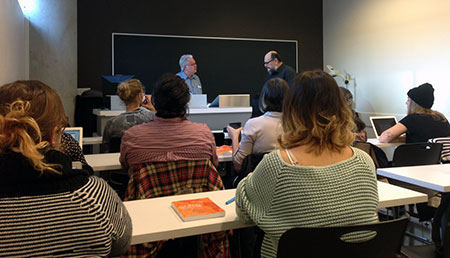
With Dr. Maximilian Forte
The lecture on October 9, 2013 by Arnold August was initiated with a short introduction to further assist the students in developing a pluralized understanding of democracy so as not to be limited with a focus based on the U.S.-centric view. This opening of the horizons is one of the goals of the course. This objective was facilitated by reviewing briefly Chapter 2, DEMOCRACY IN THE U.S. Of special interest was the first Section entitled the “Birth of the U.S. and the American Dream” including the 17th century notion of the “chosen people” and the U.S. as a “beacon for the world.” The explanation of the real origin and objective of “liberalism”, one of the most misleading terms in U.S. and international politics, served to open up a new vision. Other sections of the chapter were revealed regarding the historical limitations of real voter participation from the 18th century to present. The nature of the two-party system in the U.S. was illustrated by the Section “Competitive Multi-Party Elections: Obama Case Study.”
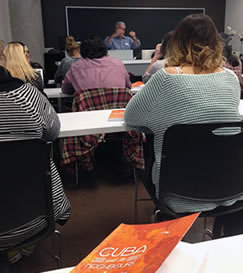
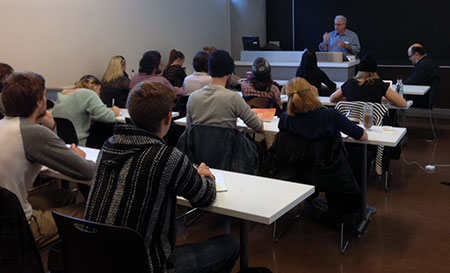
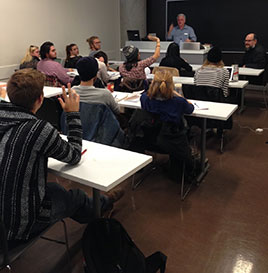 The presentation on Cuba was introduced by highlighting some important points on how elections were dealt with immediately after the 1959 Revolution (Chapter 5) The bulk of the presentation then zeroed in on Chapter 7, ELECTIONS IN CONTEMPORARY CUBA. The author presented in a graphic manner the main features of the Cuban electoral process, as well as its shortcomings and weakness and how the Cubans are striving to overcome them. In addition, the analysis of some voting trends as detailed in the book was exposed. In addition, it was shown that the tendencies as pointed out at the time of publication (January, 2013) had in fact been foreseen by the author. He revealed the latest statistics coming out of the February 2013 elections, their significance, both positive and negative. Of special interest was how the president of the Council of State, Raúl Castro was elected.
The presentation on Cuba was introduced by highlighting some important points on how elections were dealt with immediately after the 1959 Revolution (Chapter 5) The bulk of the presentation then zeroed in on Chapter 7, ELECTIONS IN CONTEMPORARY CUBA. The author presented in a graphic manner the main features of the Cuban electoral process, as well as its shortcomings and weakness and how the Cubans are striving to overcome them. In addition, the analysis of some voting trends as detailed in the book was exposed. In addition, it was shown that the tendencies as pointed out at the time of publication (January, 2013) had in fact been foreseen by the author. He revealed the latest statistics coming out of the February 2013 elections, their significance, both positive and negative. Of special interest was how the president of the Council of State, Raúl Castro was elected.
The last portion dealt with the concluding Chapter THE FUTURE OF DEMOCRATIZATION: FACING THE TESTS. What are the dangers that the U.S. political system holds now, and in the near future, for the peoples of the U.S. and the world? The thought-provoking answer to this as expressed in the book was reflected on the faces and expression of the students. The current Cuban political/socio-economic situation and prospects for the future was dealt with in a frank manner, as published in the book.
The presentation was followed by a lively question and answer period.
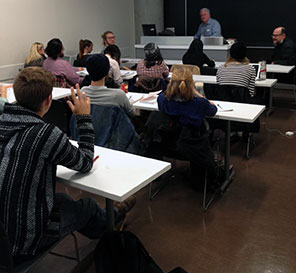
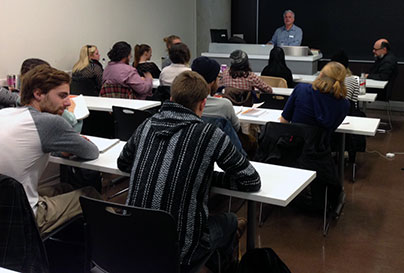
The discussion carried on after the class in the university cafeteria with some students who had the time and wanted to exchange further.
To go back to Academic Book-Tour Speaking Engagement page, click here






